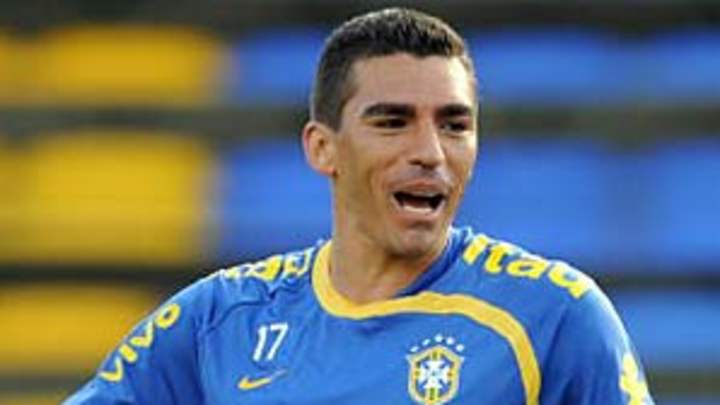Lucio matures into the outstanding Brazil defender of his generation


One down, one to go for Lucimar Da Silva Ferreira, or as he far prefers to be known, Lucio.
On May 22 the combative and classy center back helped Internazionale to the big club prize, Europe's Champions League. And now he's in South Africa, preparing and hoping to scale the summit of the international game and bring home the World Cup.
The latter triumph would almost certainly mean more to him. For a start, he is Brazil's captain. If everything goes to coach Dunga's plan, Lucio will the man to hold the trophy aloft on July 11. And also, he has only been an Inter Milan player for one season. But he has been a Brazilian for just over 32 years, ever since he was born in Brasilia on May 8 1978.
His birthplace is significant. For centuries the country debated the idea of moving its capital inland, where not only would it be less vulnerable to foreign attack, but also would help kickstart development away from the coast. An unorthodox mega project, which still divides opinions, Brasilia made this dream concrete reality when it was inaugurated 50 years ago.
Eight years ago in Japan and South Korea, Lucio became the first player born in the city to represent Brazil in a World Cup. And now he is the captain. It feels as if the modern capital has come of age. Some might even go further -- respected everywhere for his quality, will to win and absence of frivolity, Lucio could even be seen as a symbol of a country that is coming of age. Certainly his story is one of a player who has come of age.
Lucio first became known to the wider Brazilian public a decade ago during the Sydney Olympics. The gold medal is the only major title that Brazil lacks. The 2000 team were supposed to put that right, but things were going badly wrong. They were a goal down to Cameroon in the semifinal with time running out. Lucio made a desperate, long-legged surge up field. He was in a good position and expected to receive a pass -- instead attacking midfielder Roger dwelt on the ball and was fouled. Lucio was furious. He charged over to Roger and gave him a head-butt. Ronaldinho promptly scored from the free kick, forcing extra time. But even playing against nine men Brazil were beaten. The gold medal dream was deferred (in fact, 10 years later Brazil is still waiting) and Lucio was singled out as an example of a hothead, unable to control himself, unreliable at the vital moment.
Even then the young Lucio was aware of the value of defeat -- that losing today can pave the way for tomorrow's victory. He began his career with Gaura, from the Brasilia area. In one game his side conceded seven goals against Internacional from the southern city of Porto Alegre, one of the giants of the Brazilian game. Despite the scoreline, Internacional saw signs of promise in the rangy center back who kept trying throughout his team's overwhelming defeat and decided to purchase the young defender.
Just two months after the Olympic humiliation, Lucio was thrown into the deep end -- put into the center of the defense in the senior Brazil side. His selection was greeted with general consternation. What would this madman do next?
Instead, he looked instantly at home at the level. His talent and strength of character helped Brazil over the line to a qualifying place, and then to triumph in the Far East. There was the odd mistake along the way -- a slip against England let in Michael Owen for a goal in the 2002 quarterfinal -- but before long he had shown that he was able to channel his aggression positively and he had won over the previously suspicious Brazilian public.
And he has kept on doing so. Four years ago Lucio was one of the few success stories from the Germany 2006 side, and now as captain he has grown into a veritable footballing force of nature.
It was entirely fitting that he scored the goal that won last year's Confederations Cup. He had a stupendous tournament -- quick, hard and solid in defense, striding out to pass the ball better than Brazil's midfielders, and offering a threat when up in the opponent's penalty area for set pieces. He also seemed to spread through his teammates the conviction that however bad the situation might seem, Brazil would prevail in the end. He is the embodiment of Dunga's 'team-over-stars' philosophy. He gives the impression that if any of Brazil's big name stars were messing about in training, then there are still some head-butts left in his repertoire if harsh words are not enough.
Fifty-two years ago one of Lucio's illustrious predecessors invented the now traditional gesture of holding the World Cup aloft at the moment of triumph. Bellini, captain and towering center back of Brazil's 1958 side, did it in response to requests from photographers to get a clear look at the trophy, and every World Cup winning captain has copied him since.
Brasilia was in the process of being constructed when Bellini invented the gesture. And the inland capital has constructed a center back who seems to be built of concrete and steel, with a beating Brazilian heart inside. Lucio will strain every sinew to be Bellini's latest imitator on July 11.
